AI is the hot topic at the moment, and is already making a huge impact on how we do search engine marketing. This article guides you through the latest developments and what you need to know.
Impact of AI on SEO Copywriting
Content marketing is a well-established way of increasing your SEO rankings, as we showed with this case study where we raised an osteopath’s rankings across the board with targeted SEO content on specific conditions, e.g. back pain, sciatica, etc.
We create these pages by looking at many high-authority sources and collating the information, then dividing into subheadings such as What Causes Back Pain, How Is Back Pain Treated and so on. We include references to the high-authority sources and then complete with information about the clinic and a call to action to funnel the user into booking.
Of course, collating high-authority sources is precisely what ChatGPT does, and the medical content which it creates is scarily similar to what we’re getting humans to create.
On the one hand, this makes it far easier to include stacks of useful content on your website, as you can get ChatGPT to write it and then tweak it a little for accuracy. In this way you could create content for ‘condition’ or ‘treatment’ pages several times faster. Search engines are not penalising AI-created content as they originally said they may do, so no problem there.

The downfall is that your content is going to be extremely generic as everyone starts doing the same thing and every back pain page is going to say more or less the same things.
To stand out we will need to be unique. Having content which no-one else has in addition to all the generic advice will help you to stand out, both to Google and to your potential patient. If everyone else’s back pain page just contains all the generic advice and yours has the same information plus some useful personal tips and alternative perspectives, your page is more interesting and useful, which will stand in your favour in Google rankings.
Our Advice: Leverage ChatGPT to create large volumes of content quickly. Tweak it to ensure it is high quality and contains useful, high-authority outbound links, but then add some content of your own that no-one else will have and that will not be in the ChatGPT engine.
AI Generated Search Results
Search is changing massively. Bing have already incorporated an AI section into their search which can answer your questions in human language without you needing to visit a website, and Google are about to do the same with GSE (Generative Search Experience).
This has huge implications for content marketers. Where before someone would ask a question, a list of websites would come up and they would visit a website to find the information they need, now they can just chat with the search engine to get the information they need without visiting a website. The lead magnet that website has is then never seen, and the website no longer has a way of turning its content into clicks, and eventually into money.
Google’s GSE is still a way from being publicly rolled out, but Bing’s is already here. To see how it works, see this conversation I had with it below:
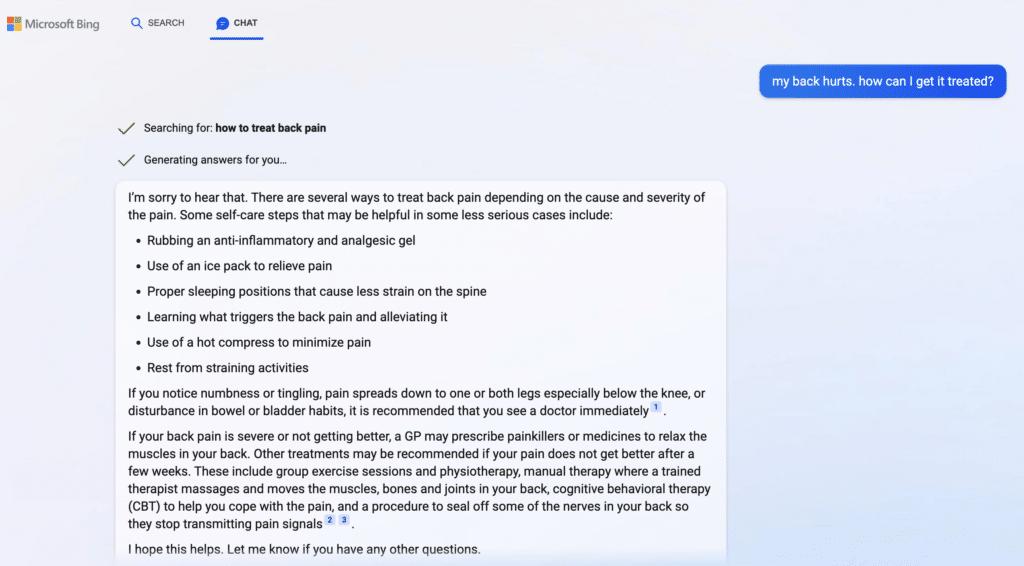
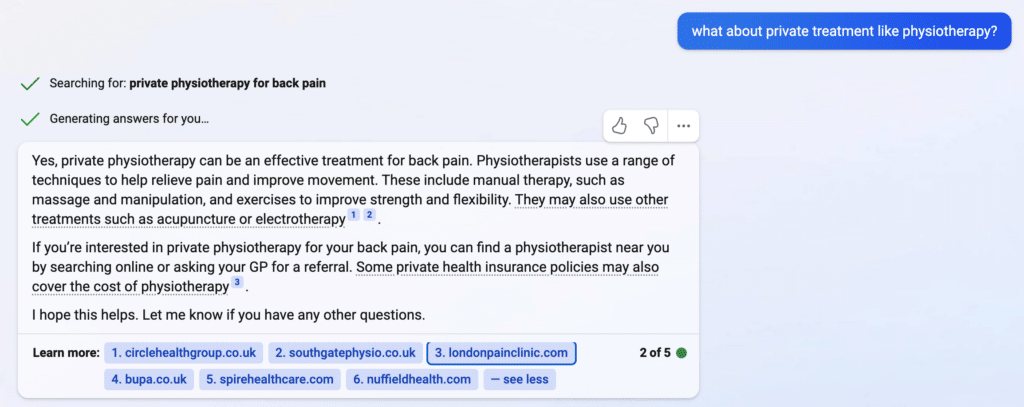
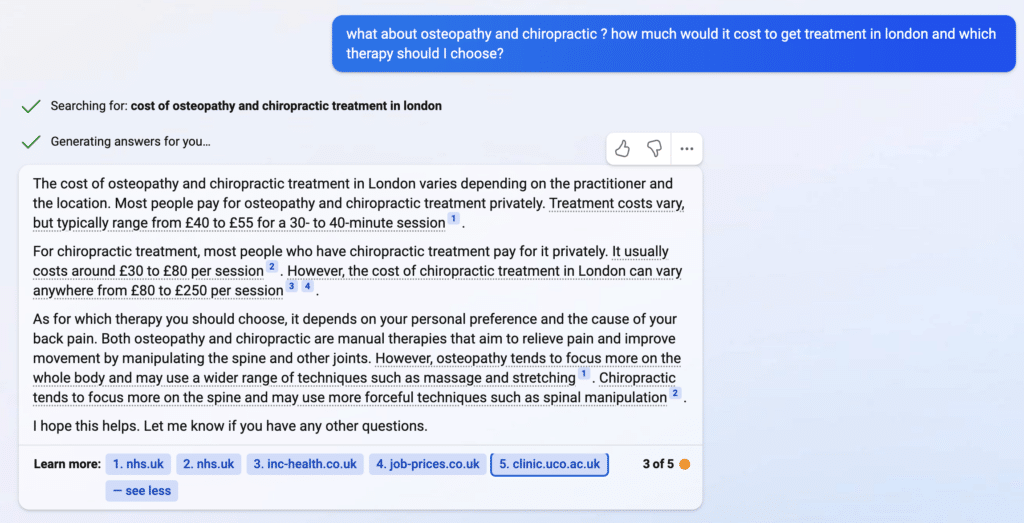
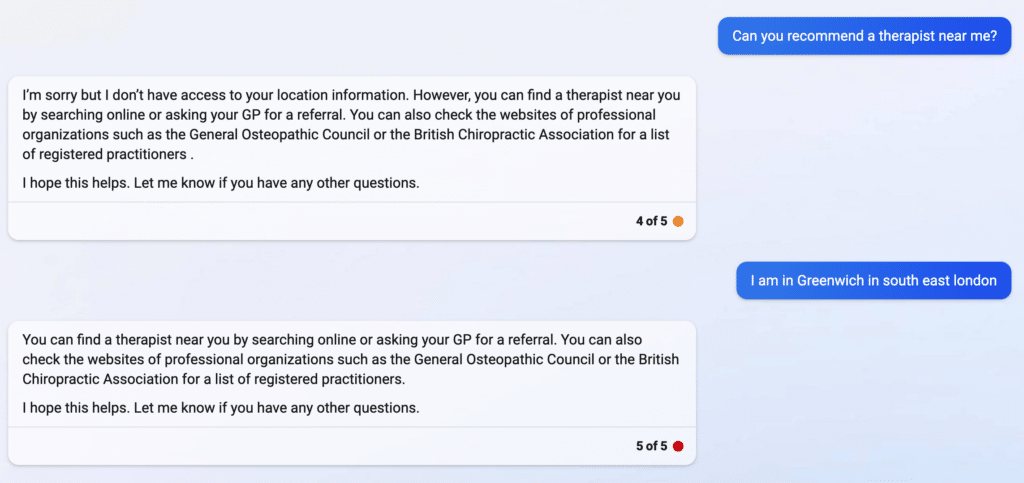
You can see that although Bing stops short of a recommendation, it does cite its sources, and among them are local clinics such as the London Pain College and University College of Osteopathy Clinic.
By creating unique and useful content and raising your website authority, you may be able to become a cited source for these search chats, meaning that your clinic name will be cited.
Unless you have the domain authority to compete for big terms like back pain, try going more niche. By answering questions in your content such as “what is the best treatment for sciatica during pregnancy” rather than general sciatica content, you stand more chance of being seen. Again, being unique and creating content no-one else will have is the key.
Getting Recommended by GSE
Although search won’t provide us with a recommendation per se, it will answer factual questions, like this:
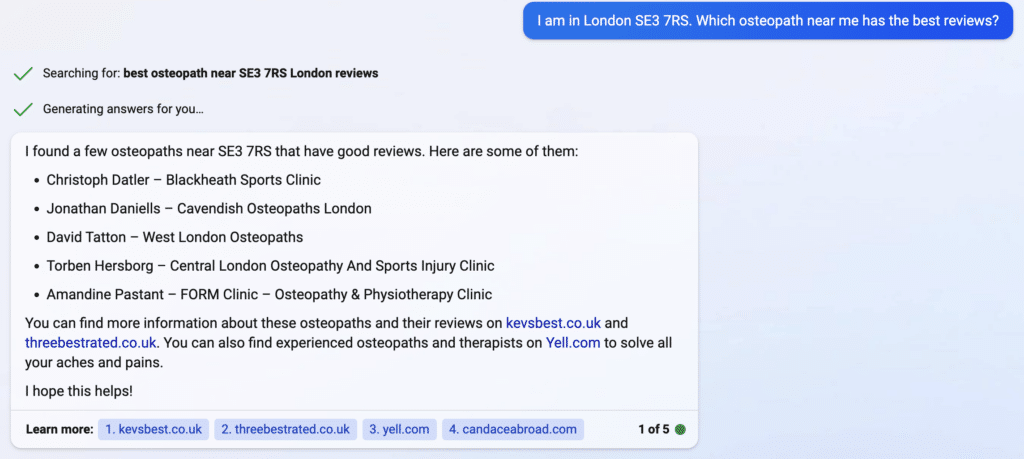

At this point Bing suggested 3 more questions, the first being the one I asked below, What are the qualifications of Christoph Datler, the first osteopath to appear above when I asked who had good reviews. So I clicked on that question.
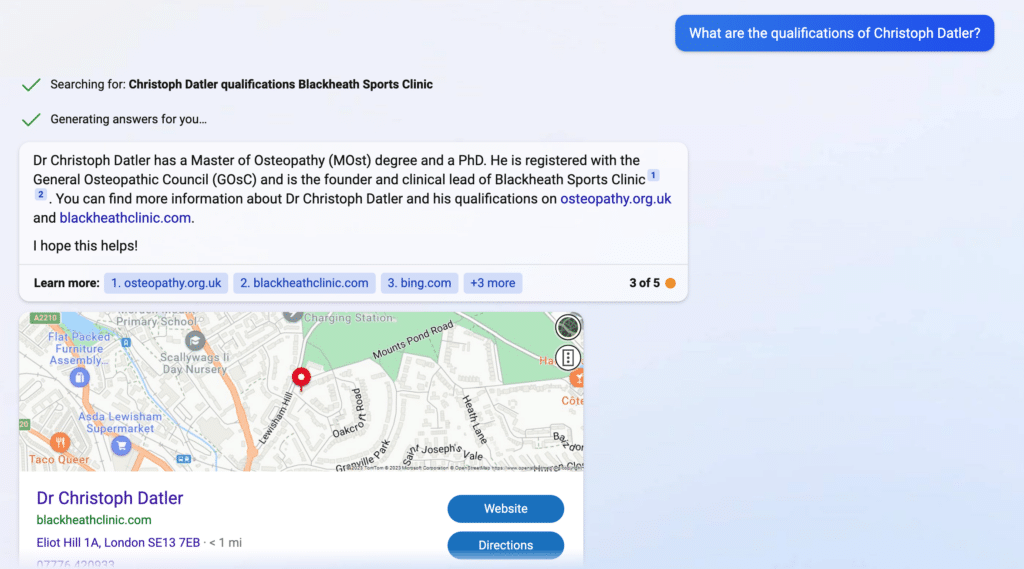
Now his details come up with a link to the website and directions.
Obviously we want our own websites to be appearing when people ask GSE these kinds of questions. Think about what people might ask – who has good reviews, who is qualified, experienced, is there parking, is transport easy, do they work with children, what are their prices, etc., and ensure all this information is clearly explained on your website to be crawled by AI and incorporated into search chats.
Our Advice: Emphasise your credentials, excellent reviews and any other USPs on your website in the same way as you would for local SEO more generally. Try to create unique content which may also help you be cited in the result..
Conclusion
AI is bringing exciting changes to how we search and find out information, and we need to stay on the pulse to make the most of the opportunities this will bring and to ensure we don’t get left behind.
The main takeaways from this article are:
- Don’t hide your light under a bushel. Make sure that Google can crawl your website and see everything that makes you special, and all practical information anyone might possibly need about visiting your clinic. This way you stand much more chance of being found by an AI-powered search chat.
- Don’t be afraid to use ChatGPT to generate content. However, edit it for quality, add links and citations, and also create your own, unique content on the subject that users won’t find anywhere else on the internet. This will allow you to rise up above the internet groupthink that will power AI and most of your competitors’ websites.
